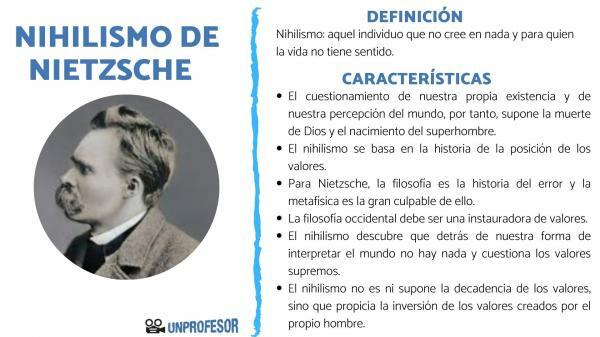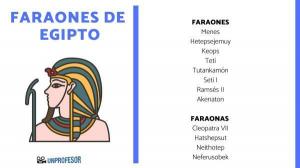What is Nietzsche's NIHILISM and its characteristics

In this lesson we explain what is the nihilism from Friedrich Wilhelm Nietzsche (1844-1900), one of the most important philosophers of contemporary Western philosophy, whose theses on philosophy, art, history, religion, sociology and anthropology, had a great influence on great thinkers What Arthur Schopenhauer (1788-1860), Max weber (1864-1920) or Michel Foucault (1926-1984).
Likewise, Nietzsche emerged as one of the greatest representatives of nihilism. Philosophical current that denies the existence and value of all things (religious, political or social belief or morality). If you want to know whatWhat is Nietzsche's nihilism and his characteristics, he continues to read this article by a PROFESSOR. Do not miss it!
To understand what Nietzsche's nihilism is 100%, we must first analyze its meaning and origin. In this way, if we study the etymology of the word, we have that it is a term that comes from Latin nihil =any. And, therefore, from its origin it has been associated with that individual who does not believe in anything and for whom life has no meaning.
Likewise, his antecedents are found in the Ecclesiastes of the Old Testament, in the thought of the sophist Gorgias (who claimed that nothing existed) and in the Cynical School (Antisthenes or Diogenes of Sinope, S.IV a. C.). Already, in the Middle Ages, Saint Augustine of Hippo (354-430) defined as nihilists those people who were not believers.
However, the term began to become popular in the 19th century, with the Russian writer Ivan Turgenev (1818-1833) and his work Fathers and sons (1862). Where the novelist uses this term to describe the character of one of his protagonists, a young skeptic and disenchanted with traditional values.
"Nihilist is the person who does not bow to any authority, who does not accept any principle as an article of faith"
Within philosophy, Friedrich Heinrich Jacobi (1743-1819), was responsible for introducing the term nihilism for the first time in a letter addressed to Fichte (1799). In this, the philosopher uses this word to criticize rationalism and establish that it should be avoided and replaced.
Currently, Nietzsche it is the maximum exponent of nihilism. Which is based on two great premises:
The hammer philosophy
The Hammer Philosophy is the one that establishes the destruction of all values traditional and their replacement by new ones. These new values, according to Nietzsche, must be created by the philosopher, destroying traditional values with a hammer.
Thus, the philosophy stands as an action that releases through the hammer and that moves away from dogmatic, theoretical and traditional philosophy (metaphysics). The death of God is forged and the new philosophy is born.
God is dead / Superman is born
By the death of God, Nietzsche refers to that supreme values, absolute truths and prejudices have died of classical-Judeo-Christian-Western culture and tradition. That is, we no longer have references or where to hold on because all of this was represented in the figure of God. (the absolute), therefore, when dying a huge void is created that was sustained by the false security that it gave us God.
Now, God dead, what is it? Well, according to our protagonist, he is replaced by science, progress and nature. Our western culture and history arrives, values are reversed / rebuilt and a new kind of man is born, the superman.
The superman, therefore, substitute for god and he is that who possesses superior morals to the previous man, who is capable of creating his own ideology and value system, who has reached a spiritual maturity So what affirms life. As Nietzsche would say:
"A nihilist is someone who prefers to believe in nothing to believe in nothing"
"The superman is the sense of the earth. Say your will: let the superman be the meaning of the earth! and I conjure you, my brothers, remain faithful to the earth and do not believe those who speak to you of hope! They are poisoners, know it or not"
In short, it is established that Western culture has reached its own ruin because its values have been devalued and have entered into decadence (metaphysics, Christianity and the old morality have been exhausted), since they do not serve to respond to the great unknowns. Thus, the function of nihilism would be to deny in order to affirm and to destroy in order to create.
Laurence Gane, P.,Nietzsche for everyone. Paidos. 2006



